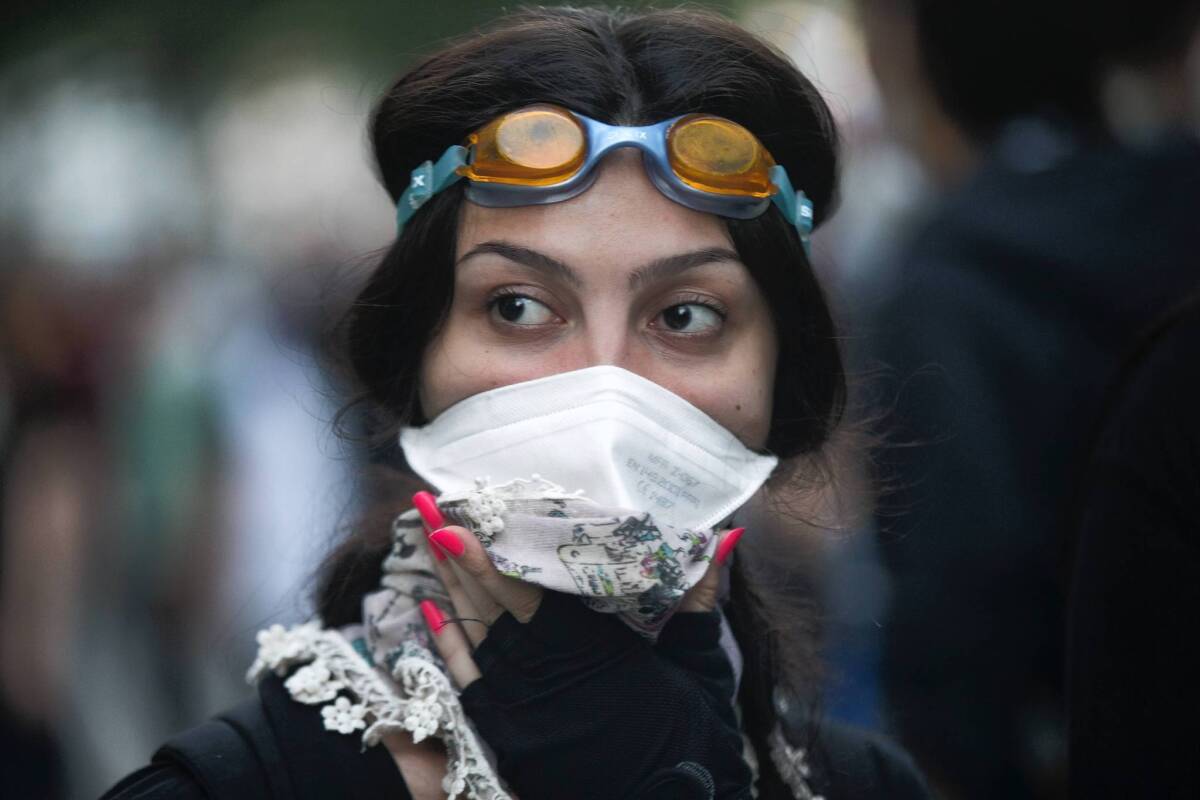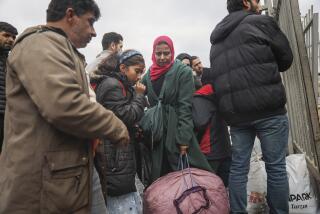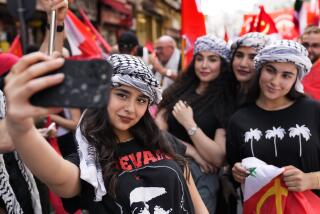Protests in Turkey focus on Prime Minister Recep Tayyip Erdogan

- Share via
ISTANBUL, Turkey — What began as local dispute about threatened green space in this metropolis has morphed into a nationwide movement protesting what critics say is the heavy-handed style and increasingly Islamist agenda of Prime Minister Recep Tayyip Erdogan.
After four days of protests, however, the staying power of a spontaneous movement lacking national leadership is far from clear. Erdogan retains substantial support, has his eyes on a run for president next year and seems unlikely to be forced from office.
All the same, a country long lauded as an economic juggernaut and democratic model for the Muslim world is abruptly faced with its most violent street protests in years. A police crackdown widely denounced as excessive has spurred a kind of referendum of the streets against the three-time prime minister.
Late Monday, thousands of protesters filled central Taksim Square again. And police once more peppered demonstrators near the square with tear gas, leaving a caustic cloud over the iconic patch of downtown.
Running battles between police and protesters were reported during the day in Ankara, the capital, and demonstrators also took to the streets in coastal Izmir and several other cities.
Although the sudden spark and the youth-led street protests are reminiscent of the “Arab Spring” rebellions, Turkey is a thriving democracy with a vibrant economy that bears little resemblance to the stultified autocracies that ruled Tunisia, Libya, Egypt and Yemen. Nor does Turkey’s multiparty political system resemble the four-decade rule of the Assad family and the Baath Party in neighboring Syria.
In fact, Turkey has been regarded as a model for countries such as Egypt trying to emerge from decades of authoritarian rule, modernize their economies and establish democratic rule.
The country is also a key U.S. ally, the eastern bulwark of the North Atlantic Treaty Organization, and its government aspires to become a member of the European Union.
Earlier Monday, this city spanning Asia and Europe appeared to be returning to a semblance of workweek normality, as workers and demonstrators cleared rubble and debris left after a weekend of street battles. But after nightfall crowds again assembled in Taksim Square and some clashes were reported.
“The problem is Erdogan,” said a protester who gave his name as Burak, a scarf covering his mouth and swimming goggles stretched around his head to protect him from tear gas. “He is imbued with authoritarianism. He can never change.”
Video showed police dispersing protesters with tear gas, water cannons, rubber bullets and batons. A doctor’s group said more than 2,300 had been injured and at least one protester had been killed, apparently after being hit by a car.
Erdogan’s Justice and Development Party, riding the nation’s economic success, won about half the vote in the most recent parliamentary elections. The economy grew by 8.5% in 2011 and 2.5% last year.
The protests appear to have evolved without national leadership and absent the urging of Turkey’s formal opposition parties, though several opposition leaders joined in denouncing what they said was an overreaction by police.
Erdogan blamed the opposition Republican People’s Party and “extremist” groups, while also lashing out at social media, a key opposition organizing tool. Published photos of the protesters cleaning up litter after rallies tended to counter the extremist label, however.
Investors seemed anxious about the globally broadcast images of chaos in Turkey’s streets, as the nation’s main stock exchange dropped by 10% by day’s end. The nation’s major confederation of public workers unions reportedly said it would stage a two-day strike beginning Tuesday in opposition to the crackdown on protests.
Behind the hostility toward Erdogan lies what appears to be widespread discontent with the prime minister’s perceived arrogance and intolerance for dissenting views on signature initiatives including Islamist-inspired restrictions on alcohol sales, curbs on the media, pro-business development schemes and the government’s aggressive policy of aiding rebels in Syria.
Erdogan, a former mayor of Istanbul, has dismissed the protesters as hooligans and extremists and rejected parallels to the “Arab Spring” turmoil. Anyone making such comparisons “knows nothing about this country,” Erdogan told reporters. He singled out Twitter as a repository of “the worst of lies.”
The government has not backed down on its plans for a shopping mall and residential complex in the park alongside Taksim Square, the issue that set off the protests. But Erdogan has said that a museum could be part of the redevelopment plan.
Protesters appear to be mostly young and secular in nature. But there are also indications that older people and pious Muslims not enamored of Erdogan’s abrasive style have joined in.
Beyond calling for Erdogan’s resignation, demonstrators don’t seem to have a clear set of broad demands, just vague slogans for greater freedom and political transparency.
“We have lost faith in our politicians,” said Emra Tashal, standing in Taksim Square. “We need a government that can carry us forward.”
The prime minister’s self-assurance — his critics call it hubris — was evident in his decision to leave the country Monday on a previously planned trip to North Africa, where many admire his style of Islamist-tinged democracy.
The prime minister appears to retain considerable support among conservative business elements who have prospered under his rule.
“These protesters are nothing,” said Ahmet Bersoz, a storekeeper whose shop sits on the fringes of the poor Kurdish neighborhood of Tarlabasi. “He [Erdogan] brought money and business to Turkey. He is developing our country.”
The prime minister, who has hinted he could easily marshal “a million” supporters to the streets, dwarfing the ranks of protesters, has preferred to restrain his backers.
So far there has yet to be a major counter-protest to that by the tens of thousands who have been vocally calling for Erdogan’s resignation. But there were signs of fissure even in Erdogan’s Justice and Development Party. Turkish President Abdullah Gul defended the right of citizens to protest, taking a softer line than the prime minister.
“Democracy does not only mean elections,” Gul said, in counterpoint to Erdogan’s suggestion that the ballot box, not the street, is the appropriate place to voice differences of opinion. “There is nothing more natural than being able to voice those differences.”
Special correspondent Johnson reported from Istanbul and Times staff writer McDonnell from Beirut.
More to Read
Sign up for Essential California
The most important California stories and recommendations in your inbox every morning.
You may occasionally receive promotional content from the Los Angeles Times.










